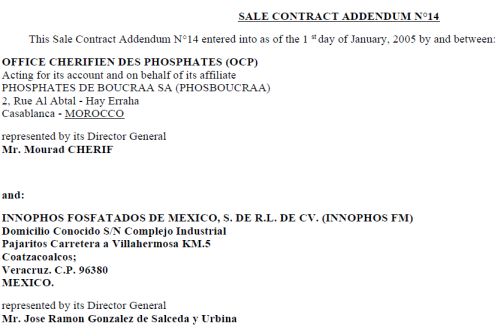
In December 2010, the long term agreement between the Mexican phosphate importer Innophos and the Moroccan phosphate company OCP expired. The trade has been going on for 18 years, and it is not known whether arrangements have been made to continue the cooperation. The firm has not yet responded to questions WSRW sent in October regarding the unethical purchases from the occupied territory.
Photo above: Vessel Sea Lavender loading phosphates in occupied Western Sahara, destined for Innophos, 14 June 2008. The trade has continued in to 2010.
In a so-called 10-K Form, submitted to the US Securities and Exchange Commission, on 8 March 2010, it appears that the long term agreement that Innophos, signed in 1992 expired in September 2010 – with an option to extension until end of December 2010. Innophos has the last 2 decades been one of the leading purchasers of phosphate rock from occupied Western Sahara. The agreement for purchasing the phosphates belonging to the Sahrawi people was signed with the Moroccan state phosphate company OCP the same autumn as the Moroccan government had accepted to arrange a referendum for independence for the Sahrawis - a referendum that never took place, and that Morocco now rejects to cooperate with the UN to arrange.
In the same report to SEC, it is stated that the firm is exploring new sources of phosphates. Innophos testing at a pilot plant has shown that other phosphate types are possible to use, according to the report.
"We obtain substantially all our phosphate rock for our Coatzacoalcos, Mexico facility from OCP, a state-owned mining company in Morocco under a 1992 supply agreement set to expire September 10, 2010, with an option to take delivery of a portion of the committed volume through December 2010. Our supply of that material could be affected by capacity constraints, political unrest, or weather conditions in the areas where our supplier operates or a failure to reach new supply agreements. Innophos has also been exploring various alternatives for phosphate rock and MGA, supplies around the world to reduce our dependence on a single supplier for phosphate rock. Through plant trials at production scale and in our pilot plant, we have made significant progress in confirming our ability to use multiple sources of rock and MGA. At the present time, we do not have committed volume beyond the expiry of our OCP contract; however, we are in active discussions with several suppliers."
No announcement has been submitted by the company as to any renewal of the agreement with OCP. It is reasonable to believe, however, that the firm has already made arrangement for further imports, and that the agreement with OCP for deliveries from the Bou Craa mine in the occupied territories could have been prolonged.
15 October 2010, Western Sahara Resource Watch sent a letter to the mother firm Innophos Holdings, Inc. regarding the trade with Western Sahara phosphates, underlining that the trade is highly unethical and in violation of international law. The firm has still not replied to the letter. WSRW asked Innophos to “immediately demonstrate its attachment to international legality, human rights and basic standards of corporate social responsibility by terminating the trade.” Furthermore WSRW asked a number of questions. Download the unanswered letter from WSRW here.
The two firms Innophos and OCP have experienced a turbulent relationship during the last years, over disagreements over prize and quantity of the phosphate deliveries. The dispute was initially announced to reach arbitration before the International Chamber of Commerce in Paris, France, but was settled in February this year.
Notice also this formulation in an Innophos report from 2009:
“Risk factor
[…]For example, our Mexican operations and indirectly our Geismar operations, (where we recently exercised an option extending to July 2021 our long-term purchase agreement for merchant green acid converted from phosphate rock), are supplied with phosphate rock from Morocco, including territories under disputed Moroccan sovereignty claims, and both could be subject to the risk of adverse affects that may arise from local political unrest.“
Download details surrounding the 1992 agreement between Innophos and OCP in this Form S-4/A report to Securities and Exchange Commission, filed 14 Feb 2006. The report specifies that the phosphates were to be sourced from the Bou Craa mine in Western Sahara.
The initial agreement was signed with the company Troy Industrias prior to the establishing of Innophos. "In 1992, Troy Industrias acquired the facility, and in 1994 formed a joint venture with Albright & Wilson (A&W Troy). In 1998 Albright & Wilson purchased the Troy Industrias interest and on March 14th, 2000 Rhodia acquired Albright & Wilson. The plant operated as a Rhodia facility until Innophos was created on August 16th, 2004", Innophos explains in a report on its Mexican operations.

Confirmed: Innophos key client of Western Sahara phosphate rock
The US company Innophos admits in its latest annual report to be purchasing the conflict mineral through PotashCorp.


